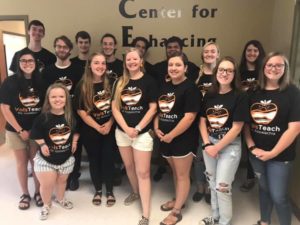Lifelong STEM Learning and Workforce Preparation Through Micro-credentials (Lifelong STEM)
The UTK Center for Enhancing Education in Mathematics and Sciences (CEEMS) partners with the East Tennessee STEM Hub (ETSH) and Union County (at risk) and Scott County (distressed) to develop and implement this project. The problem statement was developed in light of data on education and poverty and as part of discussions with key stakeholders. The project has two core aspects. The first aspect is the implementation of micro-credentials for community members including K-12 teachers, administrators, high school students, University and community college students, and parents. The STEM micro-credentials will include 4 options: Coding, Design Thinking, STEM Perspectives and Problem Solving, and Data Analytics. These micro-credentials build off of work that we have done previously in these areas for teachers and students. We will adapt them for a range of experiences and expertise in order to meet learners where they are. The micro-credentials will be offered virtually with two optional f2f meetings in order to build community and to address any questions or additional supports that are needed. CEEMS will provide cost share for 20 of the participants to attend. A second core aspect is a job and internship fair that will connect participants with businesses and industry partners. We will work with the school district partners and our network of STEM industry partners to design and implement such a networking event.
Growing STEM Teachers to Grow the STEM Workforce
Growing STEM Teachers to Grow the STEM Workforce with funding from the Appalachian Regional Commission (ARC). CEEMS partners with the East Tennessee STEM Hub, Fentress County Schools and Union County Schools to develop and implement this project. To accomplish the overarching goal of workforce preparation, the project seeks to use a multi-faceted approach to recruit and prepare individuals from at-risk and distressed counties of East Tennessee to become STEM teachers in order to expand and prepare the TN STEM workforce. Currently, there is a shortage of highly qualified math and science teachers nationally and in
 the state of Tennessee. This project will address two gateways to becoming a STEM teacher. First, the project will support high school graduating seniors and/or community college students in addressing the requirements of an introductory course (STEP1) that is part of the VolsTeach STEM Teacher preparation program at UT. This will be achieved through critical event #1, a STEM Teaching Internship that will include twenty participants. Second, the project will support twenty college graduates through critical event #2, an online course that will provide a foundation for STEM teaching
the state of Tennessee. This project will address two gateways to becoming a STEM teacher. First, the project will support high school graduating seniors and/or community college students in addressing the requirements of an introductory course (STEP1) that is part of the VolsTeach STEM Teacher preparation program at UT. This will be achieved through critical event #1, a STEM Teaching Internship that will include twenty participants. Second, the project will support twenty college graduates through critical event #2, an online course that will provide a foundation for STEM teaching
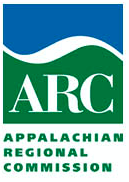 and successful completion of the content praxis examination requirement in secondary mathematics. The praxis mathematics exam is a requirement for the Job-Embedded Practitioner Teacher Education Program at UT and is historically one of the most challenging content exams. The East Tennessee STEM Hub will provide outlets for sharing the online Math Teaching Preparation (MTP) course (once tested and refined) through its participation in the Tennessee STEM Innovation Network (TSIN).
and successful completion of the content praxis examination requirement in secondary mathematics. The praxis mathematics exam is a requirement for the Job-Embedded Practitioner Teacher Education Program at UT and is historically one of the most challenging content exams. The East Tennessee STEM Hub will provide outlets for sharing the online Math Teaching Preparation (MTP) course (once tested and refined) through its participation in the Tennessee STEM Innovation Network (TSIN).
Computer Science for Appalachia (CSA)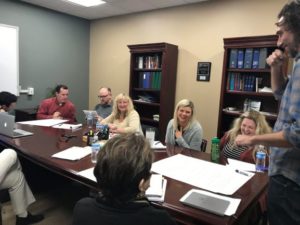
School districts in East Tennessee struggle to provide substantial computer science (CS) learning experiences that will inspire and prepare the next generation of innovators. Providing opportunities for students to engage with CS practices and ideas is urgent and timely in light of new CS standards for the State of Tennessee being implemented in the Fall of 2019. To address the needs of students in East Tennessee Appalachia, Computer Science for Appalachia (CSA): A Research-Practice Partnership to Integrate Computer Science into Rural East Tennessee Schools will create a vision for CS and support for teachers to plan for and teach CS strategies that are responsive to students and their communities. CSA will help administrators and teachers address challenges related to teaching CS, such as access to high-quality professional learning for teachers and technical infrastructure. CSA’s collaborative 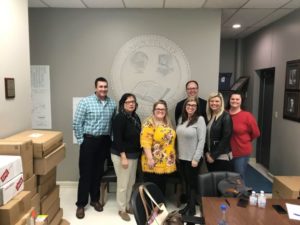 work will bring together the University of Tennessee, three rural East Tennessee school districts, and key community organizations. Building and strengthening this partnership will enhance learning and lifelong outcomes for students by increasing their opportunities to engage with CS in the elementary grades. For stakeholders as well as researchers, the project will lead to an enhanced understanding of how rural school districts create opportunities for students to engage meaningfully with CS and to a strong partnership that will enhance CS education in Appalachia in the years to come.
work will bring together the University of Tennessee, three rural East Tennessee school districts, and key community organizations. Building and strengthening this partnership will enhance learning and lifelong outcomes for students by increasing their opportunities to engage with CS in the elementary grades. For stakeholders as well as researchers, the project will lead to an enhanced understanding of how rural school districts create opportunities for students to engage meaningfully with CS and to a strong partnership that will enhance CS education in Appalachia in the years to come.
CFA is an NSF-funded project (Award Id: 1923509) and the co-principal investigators are Dr. Josh Rosenberg, TPTE and Dr. Amir Sadovnik, Computer Science, UTK
VolsTeach for Appalachia (VFA)
VolsTeach for Appalachia (VFA) is an NSF-funded project (Award Id : 1758325) that  strengthens the STEM teacher pathway from community college to high-need school districts in Appalachian East Tennessee. The project provides rural scholars unique experiences as they become culturally responsive STEM teachers.
strengthens the STEM teacher pathway from community college to high-need school districts in Appalachian East Tennessee. The project provides rural scholars unique experiences as they become culturally responsive STEM teachers.
PME 43
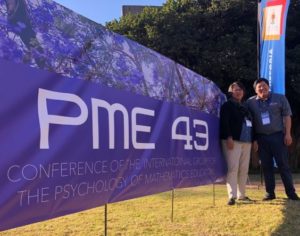 CEEMS Director Lynn Hodge shared research at the Conference of the International Group for the Psychology of Mathematics that was held in Pretoria, South Africa, this year.
CEEMS Director Lynn Hodge shared research at the Conference of the International Group for the Psychology of Mathematics that was held in Pretoria, South Africa, this year.
PME is an international group of mathematics educators and researchers who gather once a year to share work and interests at their annual conference to: promote international contacts and exchange of scientific information in the field of mathematical education; to promote and stimulate interdisciplinary research in the aforesaid area; and to further a deeper and more correct understanding of the psychology and other aspects of teaching and learning mathematics and the implications thereof.
